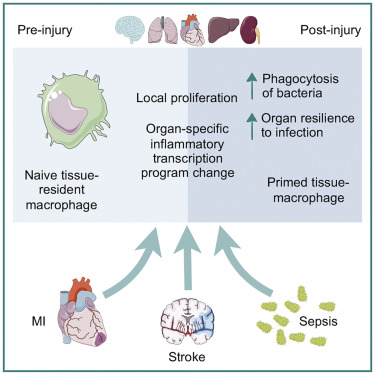Our official English website, www.x-mol.net, welcomes your
feedback! (Note: you will need to create a separate account there.)
Tissue-Specific Macrophage Responses to Remote Injury Impact the Outcome of Subsequent Local Immune Challenge.
Immunity ( IF 25.5 ) Pub Date : 2019-11-12 , DOI: 10.1016/j.immuni.2019.10.010 Friedrich Felix Hoyer 1 , Kamila Naxerova 1 , Maximilian J Schloss 1 , Maarten Hulsmans 1 , Anil V Nair 2 , Partha Dutta 3 , David M Calcagno 4 , Fanny Herisson 1 , Atsushi Anzai 1 , Yuan Sun 1 , Gregory Wojtkiewicz 1 , David Rohde 1 , Vanessa Frodermann 1 , Katrien Vandoorne 1 , Gabriel Courties 1 , Yoshiko Iwamoto 1 , Christopher S Garris 1 , David L Williams 5 , Sylvie Breton 2 , Dennis Brown 2 , Michael Whalen 6 , Peter Libby 7 , Mikael J Pittet 1 , Kevin R King 8 , Ralph Weissleder 9 , Filip K Swirski 1 , Matthias Nahrendorf 10
Immunity ( IF 25.5 ) Pub Date : 2019-11-12 , DOI: 10.1016/j.immuni.2019.10.010 Friedrich Felix Hoyer 1 , Kamila Naxerova 1 , Maximilian J Schloss 1 , Maarten Hulsmans 1 , Anil V Nair 2 , Partha Dutta 3 , David M Calcagno 4 , Fanny Herisson 1 , Atsushi Anzai 1 , Yuan Sun 1 , Gregory Wojtkiewicz 1 , David Rohde 1 , Vanessa Frodermann 1 , Katrien Vandoorne 1 , Gabriel Courties 1 , Yoshiko Iwamoto 1 , Christopher S Garris 1 , David L Williams 5 , Sylvie Breton 2 , Dennis Brown 2 , Michael Whalen 6 , Peter Libby 7 , Mikael J Pittet 1 , Kevin R King 8 , Ralph Weissleder 9 , Filip K Swirski 1 , Matthias Nahrendorf 10
Affiliation

|
Myocardial infarction, stroke, and sepsis trigger systemic inflammation and organism-wide complications that are difficult to manage. Here, we examined the contribution of macrophages residing in vital organs to the systemic response after these injuries. We generated a comprehensive catalog of changes in macrophage number, origin, and gene expression in the heart, brain, liver, kidney, and lung of mice with myocardial infarction, stroke, or sepsis. Predominantly fueled by heightened local proliferation, tissue macrophage numbers increased systemically. Macrophages in the same organ responded similarly to different injuries by altering expression of tissue-specific gene sets. Preceding myocardial infarction improved survival of subsequent pneumonia due to enhanced bacterial clearance, which was caused by IFNɣ priming of alveolar macrophages. Conversely, EGF receptor signaling in macrophages exacerbated inflammatory lung injury. Our data suggest that local injury activates macrophages in remote organs and that targeting macrophages could improve resilience against systemic complications following myocardial infarction, stroke, and sepsis.
中文翻译:

组织特异性巨噬细胞对远程损伤的反应影响随后的局部免疫挑战的结果。
心肌梗塞,中风和败血症触发全身性炎症和难以处理的全生物并发症。在这里,我们检查了重要器官中巨噬细胞在这些损伤后对全身反应的贡献。我们针对患有心肌梗塞,中风或脓毒症的小鼠的心脏,脑,肝,肾和肺中巨噬细胞数量,来源和基因表达的变化生成了完整的目录。主要由局部增殖的加剧推动,组织巨噬细胞数量全身性增加。同一器官中的巨噬细胞通过改变组织特异性基因组的表达,对不同的损伤有相似的反应。先前的心肌梗塞由于增加的细菌清除而提高了随后的肺炎的存活率,这是由IFNɣ引发的肺泡巨噬细胞引起的。相反,巨噬细胞中的EGF受体信号转导加剧了炎症性肺损伤。我们的数据表明局部损伤可激活远端器官中的巨噬细胞,而靶向巨噬细胞可提高其对心肌梗塞,中风和败血症后系统并发症的抵抗力。
更新日期:2019-11-13
中文翻译:

组织特异性巨噬细胞对远程损伤的反应影响随后的局部免疫挑战的结果。
心肌梗塞,中风和败血症触发全身性炎症和难以处理的全生物并发症。在这里,我们检查了重要器官中巨噬细胞在这些损伤后对全身反应的贡献。我们针对患有心肌梗塞,中风或脓毒症的小鼠的心脏,脑,肝,肾和肺中巨噬细胞数量,来源和基因表达的变化生成了完整的目录。主要由局部增殖的加剧推动,组织巨噬细胞数量全身性增加。同一器官中的巨噬细胞通过改变组织特异性基因组的表达,对不同的损伤有相似的反应。先前的心肌梗塞由于增加的细菌清除而提高了随后的肺炎的存活率,这是由IFNɣ引发的肺泡巨噬细胞引起的。相反,巨噬细胞中的EGF受体信号转导加剧了炎症性肺损伤。我们的数据表明局部损伤可激活远端器官中的巨噬细胞,而靶向巨噬细胞可提高其对心肌梗塞,中风和败血症后系统并发症的抵抗力。











































 京公网安备 11010802027423号
京公网安备 11010802027423号